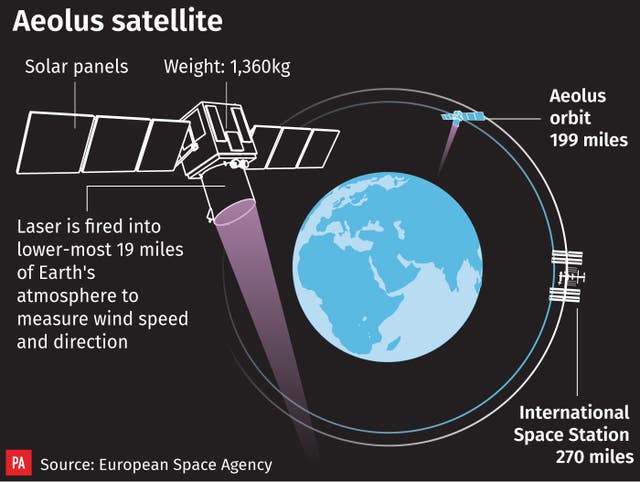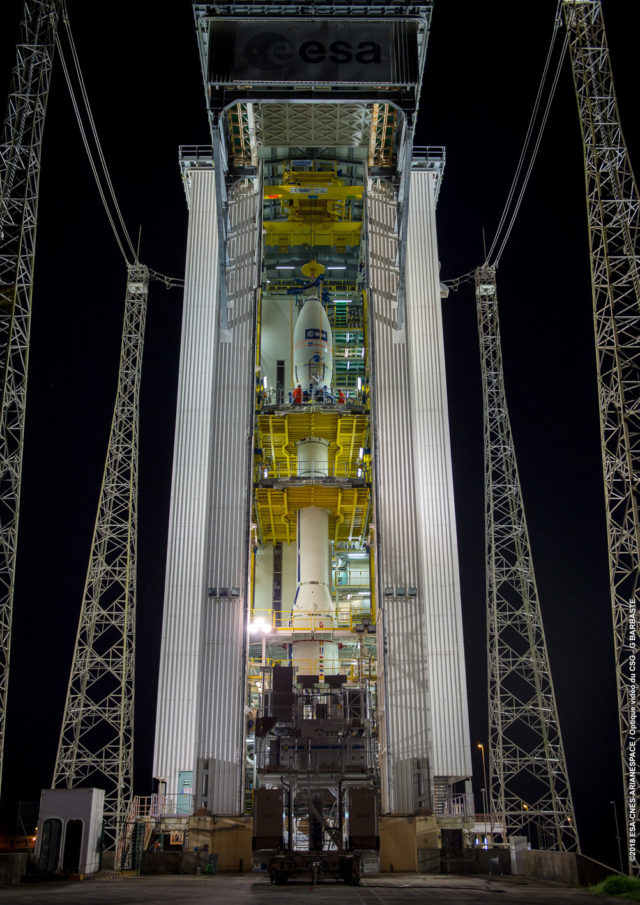
A British-built laser satellite has been launched into space on a three-year mission to measure wind speeds.
The Aeolus spacecraft took off on a rocket from Kourou in French Guiana at 10.20pm BST on Wednesday, 24 hours later than planned due to bad weather above the spaceport.

Less than an hour later, the rocket delivered Aeolus into orbit.
The European Space Agency (ESA) mission is expected to provide important data which could significantly improve weather forecasting around the world.
Aeolus, named after the keeper of the winds in Greek mythology, was originally due to launch in 2007 but the project was beset by delays.
The satellite was built by Airbus Defence and Space in Stevenage and – equipped with a powerful laser – will be the first able to directly measure wind speeds on Earth from space.
ESA’s #Aeolus wind satellite launched. Aeolus will measure winds around the globe and play a key role in our quest to better understand the workings of our atmosphere and also improve weather forecasting.Read more: https://t.co/l8tDqJhj4c pic.twitter.com/1BP1CwLdiX
— ESA (@esa) August 22, 2018
Flying 200 miles above Earth, the data it collects may improve the accuracy of weather forecasts and help protect people from disasters such as floods and hurricanes.
James Cotton, a satellite winds scientist at the Met Office, said: “The Aeolus mission aims to improve the global coverage of wind profile observations, including areas where in situ wind measurements are currently lacking, such as over the oceans, in the tropics and the Southern Hemisphere.
“Within numerical weather prediction, we expect the Aeolus winds to be particularly useful for improving our analysis of the atmospheric state in the tropics, a region where we know the model wind errors are large.”
This is what the #Aeolus launch looked like from Kourou, kms away from the launch pad: farewell Aeolus, may the winds be ever in your favour! pic.twitter.com/7DfKqX37Cg
— ESA EarthObservation (@ESA_EO) August 22, 2018
Aeolus is carrying just one large instrument, a Doppler wind lidar called Aladin.
The tool will emit short, powerful light pulses from a laser through the atmosphere and collect light that is “backscattered” from particles of gas, dust and droplets of water moving in the wind.
Meteorologists will be able to use this information to help predict the weather.

Speaking following the launch, Josef Aschbacher, ESA’s director of earth observation programmes, said: “Such pioneering technology has meant that it has been a demanding mission to develop, but thanks to all the teams involved we are thrilled that this extraordinary satellite is now in orbit. We look forward to it living up to expectations.”
Science minister Sam Gyimah said: “The Aeolus mission is a great example of the potential real-world impacts that space can have on Earth.
“Its data will lead to more reliable weather forecasts that can be used by farmers, seafarers, construction workers and others to improve productivity and safety.
“Space is a key part of our modern industrial strategy and it is work like this that shows how vital our role in the European Space Agency is in bringing real benefits to UK companies.”


Comments: Our rules
We want our comments to be a lively and valuable part of our community - a place where readers can debate and engage with the most important local issues. The ability to comment on our stories is a privilege, not a right, however, and that privilege may be withdrawn if it is abused or misused.
Please report any comments that break our rules.
Read the rules here